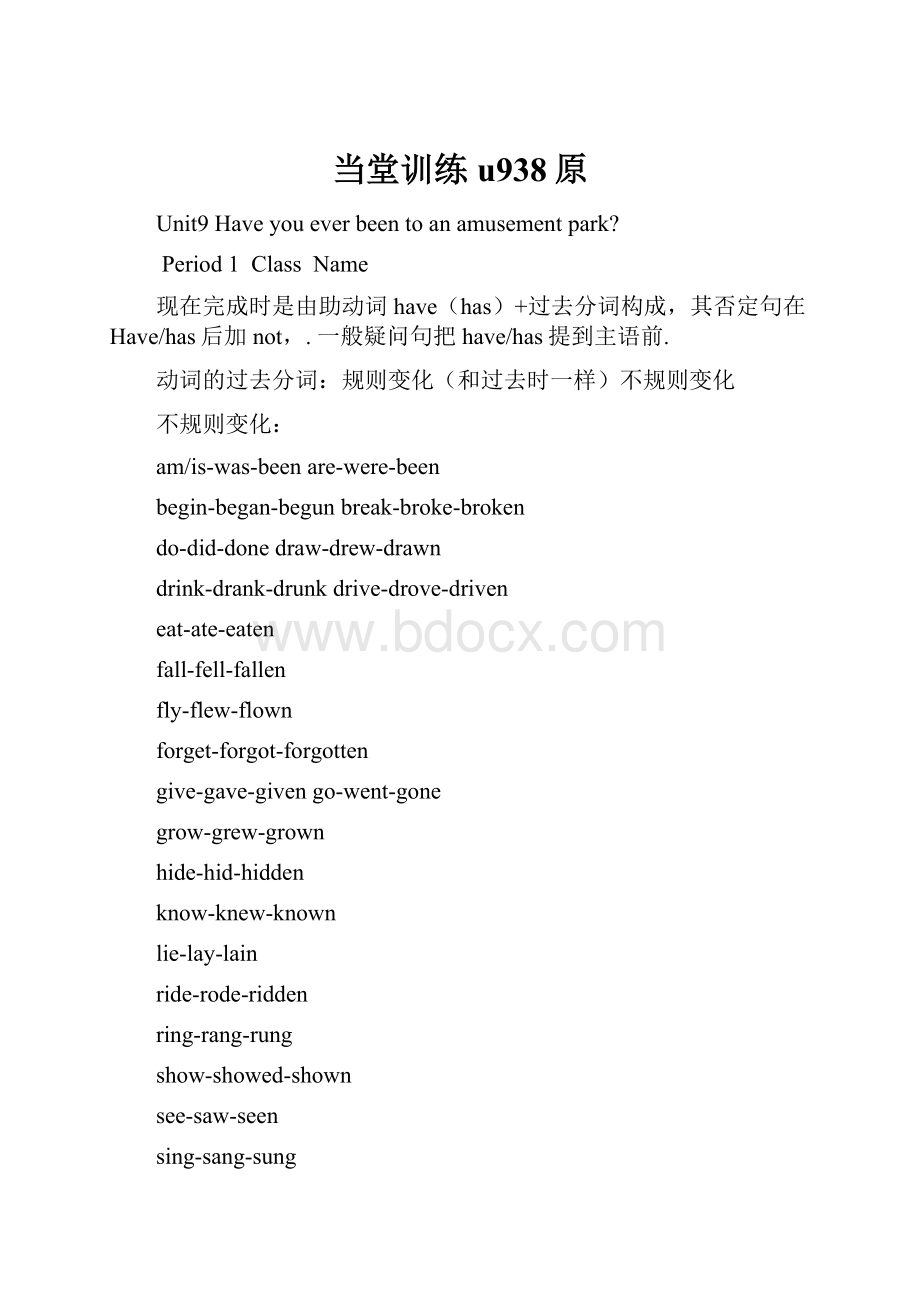当堂训练u938原.docx
《当堂训练u938原.docx》由会员分享,可在线阅读,更多相关《当堂训练u938原.docx(20页珍藏版)》请在冰豆网上搜索。

当堂训练u938原
Unit9Haveyoueverbeentoanamusementpark?
Period1ClassName
现在完成时是由助动词have(has)+过去分词构成,其否定句在Have/has后加not,.一般疑问句把have/has提到主语前.
动词的过去分词:
规则变化(和过去时一样)不规则变化
不规则变化:
am/is-was-beenare-were-been
begin-began-begunbreak-broke-broken
do-did-donedraw-drew-drawn
drink-drank-drunkdrive-drove-driven
eat-ate-eaten
fall-fell-fallen
fly-flew-flown
forget-forgot-forgotten
give-gave-givengo-went-gone
grow-grew-grown
hide-hid-hidden
know-knew-known
lie-lay-lain
ride-rode-ridden
ring-rang-rung
show-showed-shown
see-saw-seen
sing-sang-sung
speak-spoke-spoken
take-took-taken
come-came-come
run-ran–run
become-became-become
1。
表过去发生的某一动作对现在造成的影响或结果,例如
Ihavejustcleanedmyclothes.我刚洗过衣服。
(“洗衣服”是发生在过去的动作,对现在造成的结果是“衣服干净了”)
Ihavejusthadmybreakfast.(对现在的影响:
不饿)
通常与表示包括现在在内的时间副词just(刚刚),already(已经),before,yet(一般疑问:
已经;否定句:
还)never,ever等状语连用
①Ihaveneverheardofthatbefore.
②Haveyoueverriddenahorse?
③Shehasalreadyfinishedthework.
④Haveyoumilkedthecowyet?
Yes,Ihavedone
thatalready.
⑤I’vejustfinishedmyhomework.
⑥Hehasnotcomeyet.
2。
表示过去已经开始,持续到现在的动作或状态,也可以表示实质可能继续下去的动作或状态。
通常和for(段时间),since(点时间)引导的时间状语连用.以及sofar,bynow,thesedays,inthelasttenyears等连用。
Ihavebeenhereforjustovertwoyears.Hehasworkedheresince1989.从1989年,
Ihaven’tseenherthesedays.
ShehaslearntEnglishfor3years/since3yearsago.
Theyhavelivedheresince1990.
WhathashappenedtotheUSAinthelast350years?
Unit9Haveyoueverbeentoanamusementpark?
Period2ClassName
注意点一:
现在完成时与一般过去时的用法比较
现在完成时表示过去的动作一直延续到现在甚至会继续下去或表示过去的动作对现在造成的影响;一般过去时表示动作发生的时间在过去。
现在完成时属于现在时态范围,因此,不能和表示过去的时间状语连用。
如:
yesterday,lastnight,twoweeksago等
试比较:
Theplanehasarrived.飞机已经来了。
(说明现在的情况:
飞机在这儿)
Theplanearrivedaquarterago.飞机是一刻中以前来的。
(强调动作发生的时间在过去)
Ihavetaughthereforfifteenyears.我在这儿已经教了十五年。
(表示十五年前的动作一直延续到现在,还可能会继续。
)
Itaughthereforayear.我过去在这儿教过一年。
(表示“我“现在已经不在这儿任教了)
练习题:
1.A:
火车已经开走了.
B:
什么时候开走的?
A:
半个小时之前开走的.
2.A:
这本书我已经买了两年了.
B:
你在哪儿买的?
A:
在我老家买的.
3.A:
你看过这部电影吗?
B:
看过.
A:
什么时候看的.
B:
上周星期天看的.
注意点二、非延续性动词与现在完成时
短暂性动词在肯定句、疑问句中不能与时间段连用,这些动词是:
become,begin,buy,borrow,arrive,come,die,fall,finish,gettoknow,go,join,leave,marry等。
为了表述这种意思,我们常用相应的延续性动词have,keep等来代替非延续性动词。
他入党五年了。
HejoinedthePartyfiveyearsago.
——HehasbeeninthePartyforfiveyears.
——HehasbeenaPartymemberforfiveyears.
——itisfiveyearssincehejoinedtheParty
电影开始五分钟了。
Thefilmbeganfiveminutesago.
——Thefilmhasbeenonforfiveminutes.
——Itisfiveminutessincethefilmbegan
瞬间动词与延续性动词的转换
come/go—be(in)
leave—beaway
borrow—keep
buy—have
die—bedead
gettoknow—know
begin—beon
goout—beoff
goout—beoff
arrive–behere/there
marry/getmarried(to)—bemarried(to)
begintowork/study/live–work/study/leave
fallasleep/gettosleep—beasleep
jointheParty—beintheParty/beamemberof
练一练
1.Ihaveborrowedthebookfor2weeks.()
2.Thefilmhasbegunfor5minutes.()
3.这辆自行车我买了两年了。
I’ve_____thebike_____twoyears.
4.HeleftNanjingtwoyearsago.
He____________________Nanjingfortwoyears
5.Themonkeydiedlastmonth.
Themonkey_______________foramonth.
6.-A:
Honglong_____you____()-B:
Twoweeks.
A.did,getillB.have,fallenillC.were,illD.have,beenill
注意点三:
havebeenin,havebeento与havegoneto的用法
1、have(has)beenin表示“在某地(多长时间)”,现在仍在那里。
常与表示一段时间的状语连用。
例如:
Mr.BrownhasbeeninShanghaiforthreedays.布朗来上海已经有三天了。
TheyhavebeeninCanadaforfiveyears.他们到加拿大有五年了。
2、have(has)beento表示“曾经去过某地”,现在已经不在那里了。
可与just,ever,never等连用,例如:
Ihavejustbeentothepostoffice.我刚才去邮局了。
MaryhasneverbeentotheGreatWall.玛丽从未去过长城。
HaveyoueverbeentoHangzhoubefore?
你以前曾经去过杭州吗?
Have(has)beento后面可接次数,表示去过某地几次。
例如:
Theyhavebeentothatvillageseveraltimes.他们去过那个村庄好几次了。
3、have(has)goneto意为“到某地去了”,表示到了某地或正在去某地的途中。
总之,说话时该人不在现场,例如:
----WhereisTom?
----Hehasgonetothebookshop.他到书店去了。
JackJohnsonhasgonetoLondon.杰克.约翰逊到伦敦去了。
练习:
用have(has)been或have(has)gone填空
A:
Where__1__LiFei__1__?
B:
He__2__toHainanIsland.
A:
Howlong__3__he__3___there?
B:
He___4__thereforthreedays.
A:
Whenwillhecomeback,doyouknow?
B:
I’mafraidhewon’tcomebackrecently.
A:
CouldyoutellmethewaytoHainanIsland?
B:
Sorry,I__5__never__5__there.
A:
Howmanytimes__6__LiFei__6___tothatplace?
B:
He__7__thereonlyonce
用括号中所给的动词的适当形式完成下列句子。
1.Mary_______(lose)herpen.______you______(see)ithereandthere?
2.______you______(find)yourwatchyet?
3.---Areyouthirsty?
---NO,I______just_______(have)someorange.
4.We________already______(return)thebook.
5.______they_____(build)anewschoolinthevillage?
6.---HasTomtaughtyouEnglish?
---Yes,he______(teach)usEnglishfortwoyears.
7.I______(notfinish)myhomeworkyet.Canyouhelpme?
8.What______they_____(do)withthenewspaper?
Theyhavereadthem.
9.---Thedoorisopen.Who______(open)it?
Doyouknow?
---Sorry,Idon’tknow.
10.Myfather_____(read)thenoveltwice.
11.WuDong_____(be)asoldierforoneyear.
12.Thestudents______(study)inthemiddleschoolsincelastmonth.
13.Howlong______you______(know)him?
14.Mike______(make)quiteafewfriendssincehecametoChina.
15.I_____(give)myfriendanicebookrecently.
16.LiPingandWuDong______(see)theoldmanthreetimes.
17._____sheever_____(teach)youEnglish?
18.Thesechildren_____(stay)intheparkfortwohours
Unit9Haveyoueverbeentoanamusementpark?
Period3ClassName
other,others,the other,the others,another,anyother,anyothers
(1)other作形容词,通常用在单数或复数名词的前面,意为“别的;其他的;另外的”。
I'llcomeagainsomeotherday. 我改日再来。
(2)others(=other+复数名词) 泛指“部分”含义,用于已知的一些人或物中,除去某些后余下的人或物中的一部分。
ThestudentsofClassFourarecleaningtheclassroom.Somearecarryingwater,othersaresweepingthefloor.
四班的学生们在打扫教室。
一些人在打水,另一些人在扫地。
(3)theother:
表示已知的两个(或两部分)人或事物中,特指的“另一个”或“另一些”,其后可跟单数或复数名词。
Ihavetwobrothers.Oneisadoctor,andtheotherisateacher.我有两个兄弟。
一位是医生,另一位是教师。
(4)theothers(=the other+复数名词)指一定范围内除去一个或一部分后,“余下的人或物的全部”。
Thiscompositionisbetterthantheothers. 这篇作文比其他那些都好。
(5)another泛指不定数中(三者或三者以上)的“另一个”。
another前面不能用定冠词the,它作为限定词(定语)通常与单数名词连用,但是它后面可以跟few或基数词的复数名词。
Thisglassisbroken,getmeanotherplease. 这只玻璃杯坏了,请给我再拿一个。
I'llstayhereinanotherfewdays. 我要在这儿再呆几天。
注意:
other和another都可以用来修饰数词,表示“另外的;附加的”,但是结构不同。
other的位置是“数词+other+复数名词”,相当于more的用法;而another则是“another+数词+复数名词”。
Iwroteanothertwolettersthisafternoon.=Iwrotetwootherlettersthisafternoon.
=Iwrotetwomorelettersthisafternoon.今天下午我又写了两封信。
(6)anyother 表示一个之外的其它任何一个,而不是两个之中的另一个。
(7)anyothers表示一些之外的其他一些。
Ⅰ.选词填空
1.He_____(毕业)fromacollegeinShandongProvince.
2.Iwillthinkabout_____(成为)anEnglishteacherwhenIgrowup.
3.Shecangettotravel____________________(全世界)asaflightattendant.
4.CrouchingTiger,HiddenDragonwon4_____(奥斯卡奖)in2001.
Ⅱ.单项选择
1.Hasthetrain_____yet?
A.gottoB.reachedC.arrived D.arrivedat
2.Theteacherasked_____.
A.what’syourname B.whatwasyourname
C.whatyournameis D.whatyournamewas
3.—DoyoumindifIstayherealittlelonger?
—_____.
A.No,youcan’t B.Yes,youmay
C.Certainlynot D.Yes,notatall
4.Howlonghashisbrother_____thebook?
A.kept B.boughtC.lentD.borrowed
5.I’veneverseensuchafinepicture_____.
A.ago B.beforeC.yet D.later
6.—HastheforeignerbeentomanyinterestingplacesinBeijing?
—Yes,buthehasnot_____beentomanyotherpartsofChina.
A.already B.stillC.yet D.never
Ⅲ.完成对话
Jack:
Hi,Tom.I__________youforalongtime.Where_____you_____?
Tom:
I__________toXi’an.
Jack:
Really?
How_____you_____there?
Tom:
By_____.
Jack:
__________didittakeyoutoflythere?
Tom:
Less_____twohours.
Jack:
__________didyougothere?
Tom:
I_____there_____aholiday.
Jack:
Didyou_____agoodtimethere?
Tom:
Yes,I_____myselfverymuch.
Jack:
I’mvery__________hearthat.
Tom:
_____alot.
Unit9Haveyoueverbeentoanamusementpark?
Period4ClassName
already,still与yet
(1)already用于肯定的陈述句,也可用于疑问句,表示期待肯定回答,或表惊讶。
或用于否定句,带有否定含义。
WhenIarrived,hewasalreadythere.我到达时,他已在那儿了。
Isitsixo’clockalready?
已经到6点钟了吗?
(2)still通常置于句子中间,意为“仍然,依旧”。
例如:
Shestilldoesn’tunderstand. 她仍然不明白。
(3)still还可作形容词,意为“静止”。
例如:
Thesoldierstoodtherestill. 那位士兵站在那一动不动。
(4)yet与already意思相近,一般用于否定句和疑问句中,常置于主要动词之前或句末。
例如:
Wehavenotyetbeenthere. 我们还没有到过那儿。
一、根据句意和首字母提示完成单词。
1.Haveyoueverb___________toamuseum?
2.Theyhavep___________seenthemovie.It’ssointeresting.
3.Ihopethattheywillhaveaw______________timeintheamusementpark.
4.Inthelasttwentyyearsgreatc_____________havetakenplaceinLinyi.
5.Id_____________thatthemostexcitingthingintheholidayistraveling.
6.Aftersheg___________fromtheuniversity,shebecameaflighta_________.
7.Hehasbeenatourg______________foralotofyears.
8.ChinesestudentsareinterestedinEuropeanc_________________.
9.Manypeople,e_____________youngpeoplelikeAmericanmovies.
二、用所给的正确形式填空。
1.He___________ever___________(be)totheHistoryMuseumseveraltimes.
2.—_______________youever_____________(be)tothezoo?
—Yes.I________(go)therelastsummer.I_______(see)manykindsofanimalsthere.
3.—WhereisMr.Wang?
—He_________(go)tothelibrary.Hewantstoborrowsomelibrarybooks.
4.Rodgers______(plant)thosetrees.He